Daily History Lesson – November 4
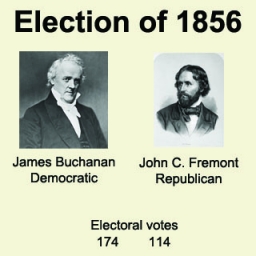
1856 – James Buchanan, who was at that time the U.S. ambassador to the United Kingdom, defeated John Fremont to become the 15th President of the United States.
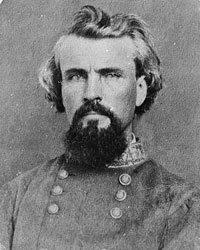
1864 – At the Battle of Johnsonville, Tennessee, Confederate General Nathan Bedford Forrest subjected a Union supply base to a devastating artillery barrage, destroying millions of dollars in materiel. Hoping to thwart Union General George Sherman’s army as they prepared for their “march to the sea,” Forrest mounted an ambitious raid on Union supply routes in western Tennessee and Kentucky. Johnsonville was an important transfer point from boats on the Tennessee River to a rail line that connected with Nashville to the east. When Sherman sent part of his army back to Nashville to protect his supply lines, Forrest brought up artillery and began a barrage that was devastating.
One observer noted, “The wharf for nearly one mile up and down the river presented one solid sheet of flame.” More than $6 million worth of supplies were destroyed, along with four gunboats, 14 transports, and 20 barges. General George Thomas, commander of the Union force at Nashville, had to divert troops to protect Johnsonville.
After the raid, Forrest’s reputation grew, but the raid did not deter Sherman from embarking on his expedition across Georgia.
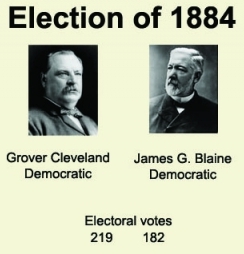
1884 – New York Governor Grover Cleveland defeated James Blaine (who was, despite what the photo above states, a Republican) in one of the closest electoral contests in history. Cleveland barely managed to win his home state of New York and, with its 36 electoral votes, won the election 219-182.
1922 – British archaeologist Howard Carter and his workmen discovered a step leading to the tomb of King Tutankhamen in the Valley of the Kings in Egypt. Thus began a monumental excavation process in which Carter carefully explored the four-room tomb over several years, uncovering an incredible collection of several thousand objects. The most splendid architectural find was a stone sarcophagus containing three coffins nested within each other. Inside the final coffin, which was made out of solid gold, was the mummy of the boy-king Tutankhamen, preserved for more than 3,000 years. Most of these treasures are now housed in the Cairo Museum.
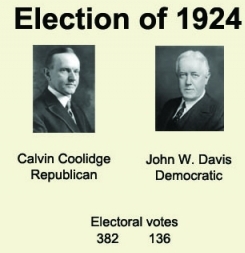
1924 – Calvin Coolidge, who had become president following the death of Warren G. Harding, easily won re-election by outdistancing his opponent, John W. Davis.
1924 – Nellie Tayloe Ross won a special election to succeed her late husband as Governor of Wyoming, and in doing so, she became the first female governor in U.S. history.
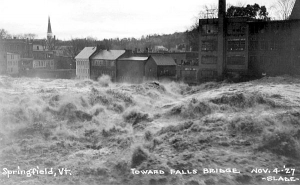
1927 – 10 days of extremely heavy rain in New England caused major flooding which went on to kill 200 people and cause millions of dollars in damages. Vermont’s Green Mountain region was particularly hard hit by the storm.
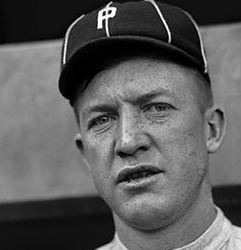
1950 – Baseball Hall of Fame pitcher Grover Cleveland Alexander died at the age of 63.
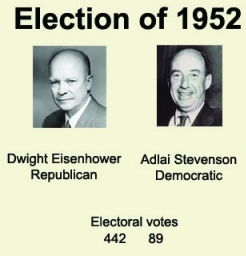
1952 – With the United States in the middle of the Korean War, and Cold War fears running deep throughout the land. Dwight D. Eisenhower, a World War II hero, won a sweeping victory over Democrat Adlai E. Stevenson to become the 34th president of the U.S.
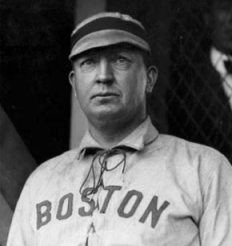
1955 – Baseball Hall of Fame Pitcher Cy Young died of natural causes at the age of 88. During his 21-year career, Young established numerous pitching records, some of which have stood for a century. One of those records – 511 career wins – will never be broken. The Cy Young Award, which is presented to the best pitchers in both leagues each year, is named in his honor.
1956 – A spontaneous national uprising that began 12 days before in Hungary was viciously crushed by Soviet tanks and troops on this day. The Soviet action stunned many people in the West. Soviet leader Nikita Khrushchev had pledged a retreat from the Stalinist policies and repression of the past, but the violent actions in Budapest suggested otherwise. An estimated 2,500 Hungarians died and 200,000 more fled as refugees.
Voice of America radio broadcasts and speeches by President Dwight Eisenhower and Secretary of State John Foster Dulles had recently suggested that the United States supported the “liberation” of “captive peoples” in communist nations. Yet, as Soviet tanks bore down on the protesters, the United States did nothing beyond issuing public statements of sympathy for their plight.

1958 – Angelo Roncalli became Pope John XXIII. He was expected by many to be a caretaker and transitional pope, but he astonished the church and the world with his energy and reforming spirit. His convening of the Second Vatican Council and his changing of the church’s attitudes toward those who were not Catholic were milestones.
1963 – Pitcher Roger Craig was traded from the New York Mets to the St. Louis Cardinals. What made the trade interesting was the fact that during the 1962-1963 seasons, Craig had a combined pitching record of 15-46. Both Craig and the Cardinals believed a “change of address” would turn his career around. They were both wrong. In the 1964 season, Craig was 7-9 and was traded again after the season.
1966 – The Flood of the Arno River in Florence, Italy, killed hundreds of residents and left 5,000 families homeless. Approximately 600,000 tons of mud, rubble and sewage severely damaged or destroyed numerous collections of written work and fine art for which Florence is famous. In fact, it is estimated that between 3 and 4 million books/manuscripts were damaged, as well as 14,000 movable works of art.


1970 – Genie, the pseudonym of a 13 year old feral child, was taken into custody in Los Angeles, a victim of extraordinarily severe abuse, neglect and social isolation. Genie’s father had kept her locked alone in a room from the age of 20 months to 13 years, 7 months, almost always strapped to a child’s toilet or bound in a crib with her arms and legs completely immobilized, and left her severely malnourished. During this time she was never exposed to any significant amount of speech, and as a result she did not acquire language skills. Her circumstances are prominently recorded in the annals of abnormal child psychology.
On November 20, while at his house on the morning before a scheduled court appearance on charges of child abuse, Genie’s father committed suicide.
Genie was raised in a string of foster home parents after her case failed to yield pivotal results or make any reputations in the field of linguistics. She now lives in obscurity in a sheltered institution and is very withdrawn.
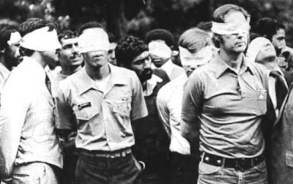
1979 – Hundreds of Iranian students stormed the U.S. Embassy in Tehran, taking more than 60 American hostages. The students, supporters of the conservative Muslim cleric Ayatollah Khomeini, were demanding the return of Iran’s deposed leader, the Shah Mohammed Reza Pahlevi, who had fled to Egypt in January 1979 and by November, was receiving cancer treatment in the U.S. After the student takeover, President Jimmy Carter ordered a complete embargo of Iranian oil.
The embargo only exacerbated an energy crisis that had been going on since the beginning of 1979. An Iranian oil-field strike and the January revolution had disrupted oil supplies from that part of the Middle East, and the Organization of Petroleum Exporting Countries (OPEC) cartel had announced a per-barrel fee increase that sent prices inching toward an all-time high. By the time the students took over the Embassy in November, Americans were already dealing with the effects of this crisis: long lines and short tempers at gas pumps, panics over gasoline and heating oil shortages, and frustration with the inefficient, gas-guzzling vehicles manufactured by American automakers.
The hostage-takers, declaring their solidarity with other “oppressed minorities” and “the special place of women in Islam,” released 13 women and African Americans in the middle of November 1979. The remaining 52 hostages were held captive until January 1981, a total of 444 days of captivity. The hostage crisis compounded the energy crisis, and, in fact, many historians believe that the combination of the two events cost President Carter the 1980 election.
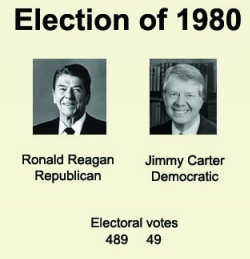
1980 –Republican Ronald Reagan defeated President Jimmy Carter in a landslide to become the 40th President of the U.S. Third-party candidate John Anderson, running as an Independent, won nearly six million votes, but giving all of those votes to Carter still wouldn’t have won him re-election.

1987 – Lisa Steinberg was the adopted daughter of Joel Steinberg and Hedda Nessbaum, a well-educated, upper-class couple. By most accounts, Joel was a millionaire. He was a criminal defense attorney and she was an Associate Editor of children’s books. They lived in a Greenwich Village apartment in New York City – the same building in which Mark Twain once lived. In addition to Lisa, Joel and his common-law wife, Hedda, had adopted a boy, Mitchell. They seemed like the picture perfect family.
On this day, six-year-old Lisa died in a New York City hospital. It was determined that the cause of her death was a head injury apparently inflicted by a rubber headed hammer. The police also found Lisa’s 16-month-old brother, Mitchell, chained up and lying in his own feces. Mitchell was alive but confined to sleeping on a mat. The house was filthy and contained large quantities of cocaine and other drugs as well as $25,000 in cash.
The couple was arrested on child abuse charges. New York law states that if one parent beats a child and the other stays silent about it, each is equally guilty. However, Hedda was later found to have been abused by Joel throughout their relationship. She suffered from nine broken ribs, a broken jaw, and a broken nose. She was not prosecuted due to the belief that years of abuse rendered her incompetent at the time of the murder.
Joel was charged with – and convicted of – first degree manslaughter. On two occasions, Steinberg was denied discretionary parole, mainly because he never expressed remorse for the killing. However, on June 30, 2004, he was paroled under the state’s “good time” law, which mandates release of inmates who exhibit good behavior while incarcerated after having served as little as two-thirds of the maximum possible sentence.
On January 16, 2007, the New York Supreme Court (Appellate Division) upheld a $15 million award against Steinberg to Michele Launders, Lisa’s birth mother. Meanwhile, Mitchell, the other child in the case, ended up being reunited with his biological mother, Nicole Bridget Smigiel.
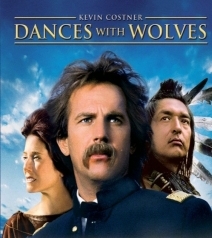
1990 – Dances With Wolves, a film about a Civil War-era soldier, premiered in Los Angeles. The film starred Kevin Costner, who was also making his directorial debut. The film was a surprise box-office success and earned 12 Academy Award nominations. It won seven, including Best Picture and Best Director.
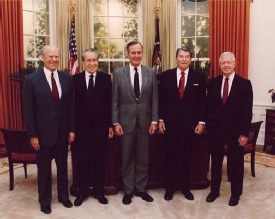
1991 – The Ronald Reagan Presidential Library and Museum was dedicated by five American presidents (the first gathering of five U.S. presidents). Former presidents Gerald Ford, Richard Nixon, President George Bush, Reagan and former president Jimmy Carter attended the ceremonies in Simi Valley, California.

1995 – Israeli Prime Minister Yitzhak Rabin was fatally shot after attending a peace rally held in Tel Aviv’s Kings Square in Israel. Rabin later died in surgery at Ichilov Hospital in Tel Aviv. The 73-year-old prime minister was walking to his car when he was shot in the arm and the back by Yigal Amir, a 27-year-old Jewish law student who had connections to the far-right Jewish group Eyal. Israeli police arrested Amir at the scene of the shooting, and he later confessed to the assassination, explaining at his arraignment that he killed Rabin because the prime minister wanted “to give our country to the Arabs.”
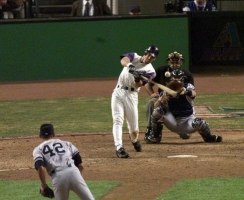
2001 – Just two outs away from their fourth championship in a row, the New York Yankees lost to the Arizona Diamondbacks in the seventh game of the World Series. Luis Gonzalez blooped a single over the heads of a drawn-in Yankees infield and the Diamondbacks – a four-year-old team from a state that was younger than the Yankees – had won their first title.
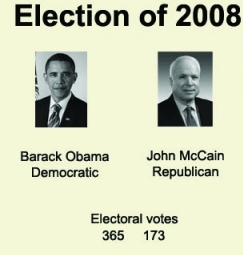
2008 – Senator Barack Obama of Illinois defeated Senator John McCain of Arizona to become the 44th U.S. president, and the first African American elected to the White House. More than 69.4 million Americans cast their vote for Obama, while 59.9 million voters chose McCain, a war veteran who emphasized his considerable legislative experience and knowledge of world politics. Obama benefited from being able to blame the Republican Party for an economy that was heading into recession.
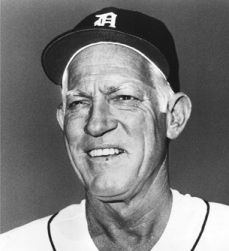
2010 – Baseball Hall of Fame manager George Lee “Sparky” Anderson, the first manager to win the World Series in both leagues (Cincinnati and Detroit) died of complications from dementia. He was 76.

2011 – Andy Rooney (field correspondent for Stars And Stripes during World War II, but best known for his weekly broadcast “A Few Minutes with Andy Rooney” as part of 60 Minutes) died after developing postoperative complications from surgery. His death at 92 came less than five weeks after he had retired.
Compiled by Ray Lemire ©2015 RayLemire.com. All Rights Reserved.
